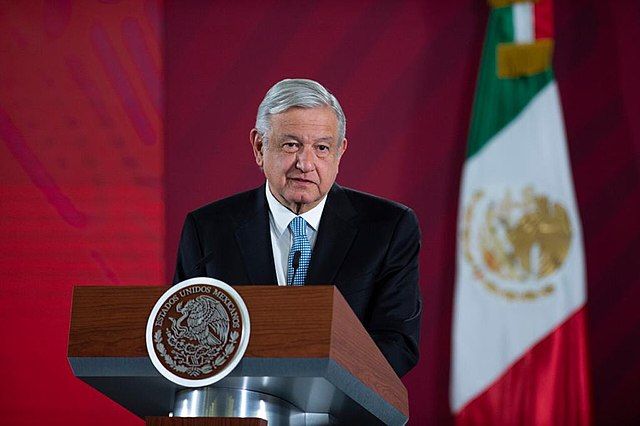1,525 kilometers long and connecting the southeastern states of Quintana Roo, Chiapas, Tabasco, Campeche, and Yucatán, the Mayan Train Project will become the signature project of current Mexican president Andrés Manuel López Obrador. Linking the major cities and tourist regions of the Yucatán Peninsula—from Cancun's beaches to Tulum's archaeological wonders—the train is expected to boost Mexico’s economy by creating jobs, increasing production, and promoting tourism.
Although the project’s benefits are clear to many, opposition has arisen from environmentalists, archeologists, political leaders, and everyday Mexican citizens. Environmentalists and archaeologists argue that plans to reroute the train line through the rainforest will cause irreversible damage to the environment, threaten ancient Maya sites, as well as threaten the Great Maya Aquifer which provides drinking water to millions of Mexicans. Largely, though, much of the controversy surrounding the creation of this railway line can be attributed to the tensions of domestic politics that have increased after Obrador’s election.
Obrador’s Presidency
In 2018, Andres Manuel Lopez Obrador (AMLO) was elected as the 65th president of Mexico. His election was the first since 1988 that a president-elect's political party also won the majority in both the Senate and Chamber of Deputies, the two houses of Mexico’s legislature. For years, Mexico had been run by two major political parties: the Institutional Revolutionary Party (PRI) and the National Action Party (PAN). AMLO unsuccessfully ran for the presidency in both 2006 and 2012, but it was not until 2018 that he was elected, introducing Morena, his political party, as the new ruling party.
The PRI was the country's dominant political party from 1929 until the 2000s. The PAN emerged as the first party to run against the PRI in 1939, but didn’t take over until 2000 when Vicente Fox Quesada was named president, breaking the 71 years of continuous ruling of the PRI. Morena’s founding in 2011 and current takeover, was therefore one of the major turning points in Mexico’s history and both a political and economic shock for individuals who had a long history of government involvement. Both the PRI and the PAN had been known to have politicians that sought not only positions of power but also personal enrichment through the illegal use of public funds or outright robbery. For instance, former Veracruz governor Javier Duarte allegedly stole almost US$3 billion dollars from state funds and was further accused of redirecting approximately US$35 million in funding for social programs to pay “phantom” companies. This legacy of corruption has made many citizens skeptical of the government's ability to represent their interests and to act in a transparent and accountable manner.
AMLO presents himself as the man of the people. Throughout his presidency, he has maintained a significant level of popular support, often attributed to his ability to connect with the concerns and aspirations of ordinary Mexicans. His emphasis on reducing corruption and improving the lives of the most vulnerable have resonated with many citizens who feel neglected by traditional political elites from the PRI and the PAN. Six months after he took office, he kicked off strongly by pursuing his agenda: he “initiated a new worker training program for youth; canceled the construction of a new airport in Mexico City; suspended oil bids and auctions for renewables; gained congressional support to create a National Guard; launched a campaign to fight fuel theft; and raised the minimum wage.” As of now, several years into his presidency, some Mexican citizens are dissatisfied with his slowing progress. In addition, criticism has been directed towards some of his policies, which are perceived by certain individuals as excessively populist in nature.
More Than a Train
The Mayan train is one of AMLO’s projects designed to help the economically depressed southeastern states and recognize Mexico’s unique culture. The expected completion date is December 23, 2023; 42 trains will be designed and built locally in the Mexican State of Hidalgo, achieving the objective of being a “Train for Mexico, built in Mexico.” He has promoted the train as a way to reduce poverty in Yucatan: it is predicted that the construction of the train will increase tourism revenue by 20 percent and create more than 1 million jobs. This intervention comes at the perfect time—according to the National Council for the Evaluation of Social Development Policy (CONEVAL), poverty in Yucatán has grown 16.6 percent over the last three years.
AMLO suggested that there has been opposition to the train from a political mafia group. He stated that these individuals “feel like the owners of Mexico and that they try to stop the country's transformation by wanting corruption and impunity to continue.” Although public statements such as this one can make AMLO’s presidency seem as the cure and hope for Mexico’s political system, it is important to acknowledge the negative sentiments that have risen due to his presidency. Some argue that AMLO’s presidency has been recently associated with Mexico’s democratic backsliding; AMLO has expressed doubts about the importance of independent public agencies, reduced the funding allocated to autonomous agencies, appointed his finance minister without following the necessary legislative procedures, and initiated infrastructure projects like the Mayan train that potentially infringe upon environmental regulations and impact local indigenous communities. Therefore, when tracing back the opposition towards the Mayan train, political tensions are closely tied to it. Although it is challenging to establish a causal link between the two, the broader discontent with AMLO's presidency has likely impacted the criticism surrounding the project. Thus, partisans strongly aligned with parties like PRI and PAN may connect the train's construction to their overall dissatisfaction with AMLO's administration.
What Comes Next
It is difficult to craft a clear solution and path for Mexico to fix its political system. Years of confinement with the same political groups have caused tremendous damage to the country, not only in terms of economic instability, but in erosion to Mexican citizens’ trust in their government. AMLO has proven to be a relief to some Mexican citizens, a sign of hope that things will improve. Supporters praise his commitment to social justice and the fight against corruption, while critics raise concerns about the long-term implications of his policies. The true measure of his legacy and impact on Mexico will become clearer over time, as his presidency progresses and the consequences of his actions unfold.





